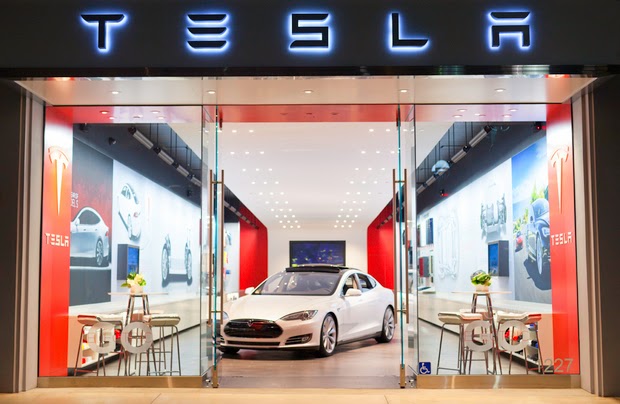How do “we” (our society, that is) determine the appropriate method for selling products? Why is gasoline sold at a gas station, cars at a car dealership, bread from groceries or bakeries, etc? Why don’t we just have stores that carry anything the merchant wants to sell that day? Why not have a chaos of mercantile activity every day?
Tesla Motors is insisting that it should sell the Model S and other Tesla cars through company-owned stores. This flies in the face of laws around the U.S. requiring that cars are sold through independent car dealerships, and some US States have stricter laws than others, with the stricter states presenting the toughest roadblock to Tesla’s car sales operations.
Essentially, in a large portion of the U.S., Tesla’s direct car sales model is illegal.
The position of Tesla’s management is that the traditional car dealership model is probably out-dated, antiquated, and in need of an overhaul across the board. That viewpoint got a huge boost a couple weeks ago when three Federal Trade Commission members penned a blog post asking why car sales are limited to car dealerships![]() ?
?
They note that in many industries the manufacturers simultaneously utilize multiple sales channels – dealerships – sales representatives – direct sales.
For example, you can buy digital cameras or computers via the manufacturer website, or online retailers, or online auction sites like eBay, or via brick-and-mortar stores. It’s up to the consumer to choose their preferred place to buy.
The FTC commissioners ask us – why are car makers prevented from doing the same?
Their explanation is that “Dealers contend that it is important for regulators to prevent abuses of local dealers” – that is, prevent car manufacturers to get into competition with their dealerships.
The FTC commissioners counter that by noting the many industries where manufacturers do compete with dealers, and that it’s fine. Instead of deciding this issue by law, the FTC commissioners suggest the issue should be settled by the competitive marketplace.
While I find their arguments compelling, I can think of some counter examples.
We do not have a random chaos of a marketplace. Instead we sell gasoline at gas stations, etc. Why? It’s partly for competitive reasons, and partly for rational safety requirements.
Gasoline sales is an example where the product, gasoline, is extremely dangerous. If sold via unsafe equipment or unsafe dealers wouldn’t there be a real danger?
Food sales, similarly, can cause grave harm (health) to the public if conducted badly.
Neither is an example where direct sales from a manufacturer would be any riskier than sales through an unregulated 3rd party. Instead, the point is that there are plenty of good reasons for having rational regulations on the marketplace.
It may be that regulations preventing direct car sales are irrational. These regulations, today, seem to do more to serve the power of the car dealership system than to give any protection to consumers. But I don’t know how to prove the regulations are bad and should change.
- Highway design could decrease death and injury risk, if “we” chose smarter designs - March 28, 2015
- GM really did trademark “range anxiety”, only later to abandon that mark - March 25, 2015
- US Government releases new regulations on hydraulic fracturing, that some call “toothless” - March 20, 2015
- Tesla Motors magic pill to solve range anxiety doesn’t quite instill range confidence - March 19, 2015
- Update on Galena IL oil train – 21 cars involved, which were the supposedly safer CP1232 design - March 7, 2015
- Another oil bomb train – why are they shipping crude oil by train? – Symptoms of fossil fuel addiction - March 6, 2015
- Chevron relinquishes fracking in Romania, as part of broader pull-out from Eastern European fracking operations - February 22, 2015
- Answer anti- electric car articles with truth and pride – truth outshines all distortions - February 19, 2015
- Apple taking big risk on developing a car? Please, Apple, don’t go there! - February 16, 2015
- Toyota, Nissan, Honda working on Japanese fuel cell infrastructure for Japanese government - February 12, 2015
















